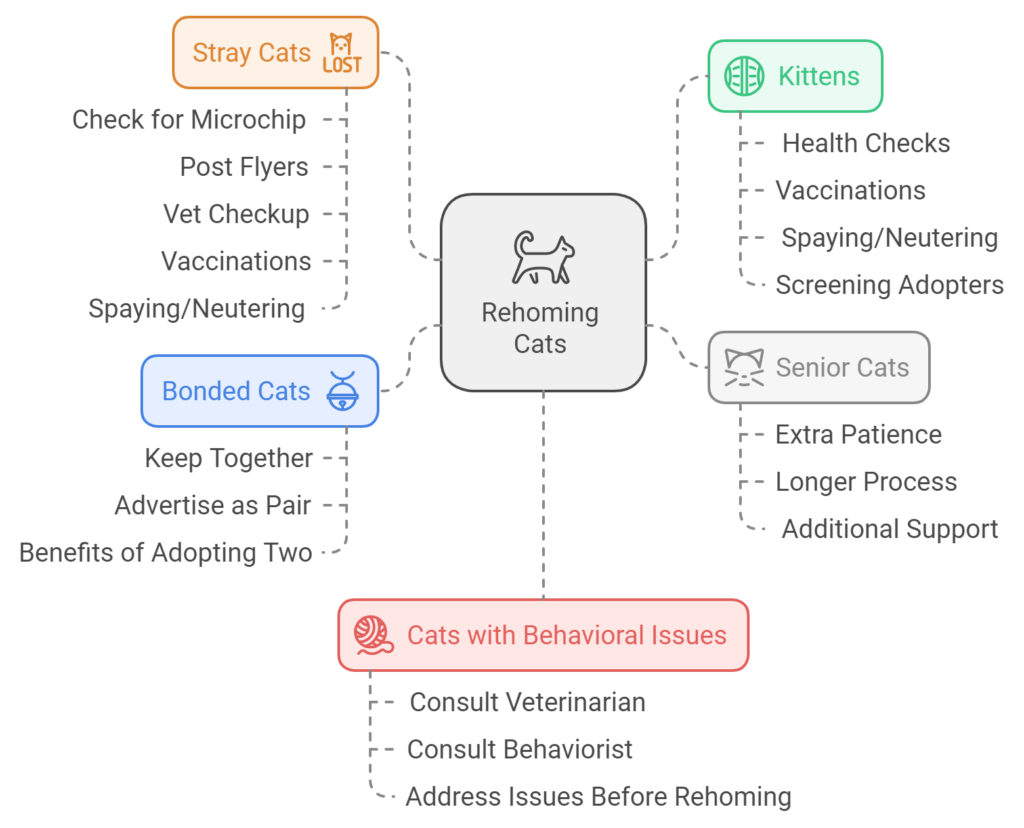How to Rehome a Cat Responsibly: Assessing Their Needs
The first step in rehoming a cat is to honestly assess the situation and the cat’s specific needs. Consider your cat’s personality, preferences, and relationship with household members, including other pets.
Ask yourself important questions: Is your cat outgoing or shy? Would they prefer a quiet or active household? What kind of environment would best suit them? These considerations are crucial for ensuring your cat ends up in a loving, compatible home.
Preparing Your Cat for Rehoming
Before you begin the rehoming process, it’s essential to prepare your cat. Schedule a vet visit to ensure they are in good health and up-to-date on vaccinations.
It’s also advisable to have your cat spayed or neutered if they haven’t been already, as this can increase their adoptability and help them transition smoothly into a new home. Keeping your cat in good health makes them more appealing to potential adopters and gives them the best start in their new life.
Finding the Right Home When Rehoming a Cat
When rehoming a cat, the priority should be to find a home directly, avoiding shelters if possible due to their limited resources. Focus on finding a loving and committed home for your feline companion.
Network with friends, family, and even neighbors to spread the word. Utilize social media and online platforms such as Home-Home.org or AdoptAPet.com to connect with potential adopters. Posting flyers in community spaces, such as pet stores and veterinary offices, can also be effective in reaching local cat lovers.
If finding a permanent home proves challenging, consider temporary foster care as a last resort. Shelters and rescue groups can also provide support, but these options should be reserved for situations when all other possibilities have been exhausted. Fostering may help expand the network of people who might be interested in adopting your cat and provide them with a comfortable place while waiting for a new home.
Effectively Screening Potential Adopters
Screening potential adopters is vital to ensure a good match and a lifelong commitment. Asking the right questions can help determine if someone is a suitable fit. Inquire about their history with pets, the compatibility of current pets, the presence of children, and whether they rent or own their home. Clarify whether their lease allows pets, and ask if they are willing to provide references or agree to a home visit.
Additionally, understanding how much time the adopter will be able to spend with the cat is key to ensuring the cat’s emotional well-being. If you receive multiple applications, it’s a good idea to collect backups. This way, if the first choice doesn’t work out, you can avoid hurting anyone’s feelings and still find a good match for your cat.
Addressing Special Considerations for Rehoming a Cat

Rehoming Kittens
Rehoming kittens comes with its own set of responsibilities. Ensuring that each kitten is healthy, vaccinated, and spayed or neutered is crucial before adoption. Screen potential adopters carefully to ensure they are committed to the kitten for life and understand the responsibility involved in raising a young cat.
Rehoming Senior Cats
Finding homes for older cats can be more challenging, as they may require extra patience and care. Be prepared for the rehoming process to take longer and try to find adopters who are capable of providing the additional support that older cats often need to adjust comfortably to a new environment.
Rehoming Bonded Cats
If you need to rehome bonded cats, it’s important to keep them together whenever possible. These cats rely on each other for comfort and companionship, and separating them can lead to significant stress. Advertise them as a bonded pair and highlight the benefits of adopting two cats that are already comfortable together.
Rehoming Stray Cats
If you’re rehoming a stray cat, first verify whether the cat is lost by checking for a microchip or posting flyers in the neighborhood. Stray cats need a vet checkup, vaccinations, and ideally should be spayed or neutered before finding a new home. It may also be beneficial to seek guidance from rescue programs that specialize in helping stray cats.
Rehoming Cats with Behavioral Issues
Rehoming a cat with behavioral issues can be more complicated, as many of these behaviors tend to persist in new environments. Before considering rehoming, consult a veterinarian or an animal behaviorist for guidance. Addressing these issues beforehand can make a huge difference in the cat’s adoptability and help ensure a successful transition to their new home.
How to Rehome a Cat: Seeking Assistance and Final Considerations
Rehoming a cat is a difficult decision, and at Sweet Purrfections, we strongly advise against it unless it is absolutely the last resort. Cats thrive on routine and stability, and being uprooted from their familiar surroundings can be a traumatic experience.
If you are facing challenges with your cat, we encourage you to exhaust all other options before considering rehoming. Doing your best to keep your cat or any other pet means ensuring they have a safe, stable, and loving environment.
If rehoming your cat still feels unavoidable, consider reaching out to local animal rescues or online rehoming services for support. Some organizations may also be able to assist with temporary boarding, help with pet-related rental fees, or offer other support during crisis situations. Seeking assistance from trusted groups can help make this challenging process a bit more manageable and ensure your cat’s well-being as much as possible.

